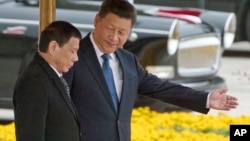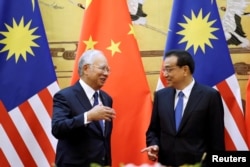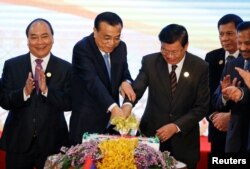In the short space of just a few weeks, China appears to have won some major diplomatic victories in Southeast Asia, with the dramatic public swing away from the U.S. by the Philippines and a high-profile visit by Malaysia Prime Minister Najib Razak's to Beijing.
But while some see the shifts as a sign that countries in the region are pivoting away from Washington and toward Beijing, others see a new and emerging balance of power as smaller countries in the region hedge their bets.
During a visit to Beijing last month, Philippine President Rodrigo Duterte announced his country's "separation" from the United States. That rift with Washington continues to deepen.
So much so, that some believe the long-standing alliance between the two countries has been left hanging in the balance.
And the Philippines is not alone.
This week, visiting Najib embraced Beijing as well, signing investment agreements totaling more than $34 billion, and Kuala Lumpur agreed to purchase four naval vessels from China.
The prime minister also talked up Beijing's role in the region and world. In an op-ed piece published Wednesday in the state-run China Daily, Najib said larger countries should treat smaller countries fairly.
"And that includes former colonial powers. It is not for them to lecture countries they once exploited on how to conduct their own internal affairs today," he wrote in the article.
The about face by Manila and warm outreach from Malaysia comes just months after Beijing's expansion in the South China Sea was rebuked by an international court.
Shifting tides
Analysts say that more than being a victory or loss for either Beijing or Washington, shifting tides of allegiance are part of a new emerging balance of power in Asia, driven by domestic politics and the diverse interests of countries in the region.
Asia has not seen someone as outspoken as Duterte since Malaysia's Prime Minister Mahathir Mohammed was in office, says Mark Thompson, director of the City University of Hong Kong's Southeast Asia Research Center.
From a Philippine perspective, he adds, it is domestic politics and nationalism driving things.
"Duterte wants to be left alone, and he feels that close ties with the West hinders him and he thinks one of the ways he can gain leverage is by making these kinds of noises," he said. "Now the extent to which Philippine foreign policy changes is still open."
Beijing-based analyst Francesco Sisci says the new reality is every country in the region is playing on every side.
"The Chinese are not naïve enough to believe that actually Duterte is really turning away from the Americans," he said. "I think he's only biding his time to see who will become the next American president."
Cozying up with Beijing has given the Philippines more power at the negotiating table with Washington, Sisci says, and more leeway to strengthen ties with other countries.
Manila is starting to see some benefits of its approach, as Beijing has allowed Filipino fisherman to return to the contested Scarborough Shoal in the South China Sea.
But keeping the focus on just the United States and China is perhaps too narrow-minded, he adds.
During the next two decades, influences in the region will change dramatically. India's importance will rise, Vietnam's economic ambitions will continue to expand, and Indonesia's population is expected to reach half a billion.
"The picture is extremely complicated and is evolving very fast," Sisci said.
And because of that, shifts are likely to come and go.
Opportunistic, pragmatic
For example, when Myanmar wanted Western investment, it took steps to liberalize. But now, some see it leaning back toward China or playing both the West and Beijing more even-handedly.
Thailand's military-led government, which has seen ties with Washington weaken, has grown closer to Beijing.
"China has been vital for the military junta there in terms of its economic situation because tourism and investment from China has been absolutely crucial,” Thompson noted. “Of course, the difference being Thailand does not have the same stake in the South China Sea issue."
Malaysia has long been a target of Chinese investment, which has helped Najib in the past. The added support from Beijing comes at a crucial time for the Malaysian leader as civil lawsuits by the U.S. Justice Department have implicated him in a money-laundering scandal. Najib has denied wrongdoing.
Some have portrayed Malaysia's agreement to purchase four littoral mission ships from China as a significant shift, but other analysts say it is more an issue of cost.
"It's cheaper to buy Chinese LMS ships, which cost about $100 million a pop, instead of buying them for $400 million each from the French, for example," said William Choong, of the International Institute for Strategic Studies in Singapore. "It's pragmatic, and it's also opportunistic."







